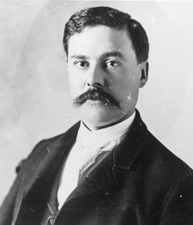After the Supreme Court decided U.S. v. Windsor and Perry v. Hollingsworth earlier this year, I remained optimistic about the fact that I would live in a state where gay marriage was illegal. I even remember telling one of my gay law school buddies that Idaho would be the last state to recognize gay marriage. Little did I know, plans were being laid to overturn the gay marriage ban in Idaho.

Two weeks ago, four lesbian couples filed a lawsuit in Federal District court in Boise. The plaintiffs allege that they were denied their right to marry under the Due Process and Equal Protection clauses of the 14th Amendment. They also allege that they were discriminated against because of their sex. Two of these couples have already been married in other states (New York and California). The other two couples sought marriage licenses in Ada County (Boise) and were denied.
At its core, the lawsuit is challenging the constitutionality of both an Idaho statute and the Idaho Constitution that prohibit gay marriage. Such laws have existed in Idaho for a long time. In 1996, Idaho passed a law which told the federal government that it wasn’t going to recognize any gay marriages that were performed in any other state, regardless of whether or not the federal government recognized them. Today we call such laws “mini DOMAs”. At the time, legislators thought this would be an additional safeguard against challenges to the constitutionality of DOMA.
In 2006, Idaho went a step further and also amended its Constitution to refuse recognition of foreign gay marriages.
This lawsuit really is unique because it is attempting to strike down both a statute and a Constitutional provision. It is also unique because the plaintiffs are making completely new arguments.
The plaintiff’s first argument is essentially that they were discriminated against because of their sex. When I first read the complaint, I had a hard time understanding why the plaintiffs would choose to make such an argument. Perhaps it is because laws that discriminate on the basis of sex are analyzed under a more rigorous legal standard. Maybe it was a strategic move by the lawyers to demanded greater recognition of gays and their relationships. Whatever the motivation was, the argument is likely to fail.
For one, LGBT individuals are not a class of people who have been singled out because of their sex. Yes, all the plaintiffs are lesbians, but the County Recorder did not refuse to grant their licenses or recognize their marriages because they were women. They refused to do so because they were gay!
It is also difficult to show how any Idaho statute or the Idaho Constitution singles out LGBT individuals based on their sex. Sex is mentioned in both laws, but only to define the proper partners of a marriage relationship within the context of Idaho law. Neither law prohibits a gay marriage based on the fact that one of the applicants is a man (or woman). I think that the plaintiffs have conflated the ideas of sex and sexual orientation in their argument.
The lawsuit is also quite unique because two of the couples are legally married. One couple was married in New York in 2012 and the other couple was married in California in 2008. Under current Idaho law, Idaho does not have to recognize these marriages even though they are valid in other states. To clear this legal hurdle, the plaintiffs will need to successfully argue that their rights, as defined in the Due Process Clause and Equal Protection clauses of the Constitution, are much broader than the Supreme Court has interpreted them to be.
This means that the plaintiff’s must show that the Founders intended to include “right to gay marriage” within the already recognized “right to marriage”. Up to this point, the Supreme Court has refused to recognize such a particular right. That was the perhaps the only victory traditional marriage advocates won in Perry and Windsor.
If a court were to recognize a “right to gay marriage”, then the “right to marriage” would essentially become a catchall right available to anyone seeking recognition of their “relationship”. Once the right is extended to include one class of people, it is hard to deny the same right to others, no matter how illogical such an extension may seem. We are already seeing calls for the recognition of polyamorous relationships in countries like New Zealand which legalized gay marriage earlier this year. It is only a matter of time before this happens in the United States.
The final argument is the Equal Protection argument. Like all the other arguments, this argument will likely fail. Gay rights advocates must be able to show that gays as a group and a class of people who have historically been hated and discriminated against and that they are powerless to defend their rights. The problem is that there is no clear pattern or history of this type of discrimination. Don’t get me wrong, there has been discrimination, but is not enough to show that gays are powerless to defend themselves. The gay rights movement has proven that it is anything but powerless when it comes to defending their rights.
In the end, I am confident that the plaintiff’s case will be dismissed. The only reason filing the case in Idaho makes sense is because the 9th Circuit Court of Appeals will hear any appeals in the case. The 9th Circuit is very liberal and will likely decide the case much like they did the Perry case. The Supreme Court may then decide to hear the case and resolve the issue once and for all. If they do, then we may be talking about gay marriage well into 2016.












